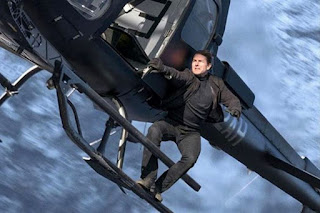Dealing with "Richard Jewell"
In another time, and with one key omission, "Richard Jewell" might be talked about in a different and more positive way.
The tale of a security guard who discovered a bomb at the Atlanta Olympics and then was wrongly suspected of being the bomber contains the elements of a painful, relevant film. It is reminiscent of another wrongly-smeared-hero film, "Sully," also directed by Clint Eastwood.
But these days "Richard Jewell" also reminds that the context in which we see movies always matters -- that what a film says and does is always filtered through what we as a culture see and do.
And that still does not take away a huge problem in the film: the portrayal of real-life reporter Kathy Scruggs (played by Olivia Wilde) who is seen not only as aggressive and ambitious but as more than willing to trade sex for a scoop. There is no reason to believe that the real-life Scruggs did that, and since she is dead she cannot defend herself. Others have spoken on her behalf, and a scene could have been trimmed to make amends, but the movie's story is unchanged.
Sure, movies about real events take liberties -- the current "Dolemite Is My Name" on Netflix is a far too sunny view of the life of Rudy Ray Moore (though played wonderfully by Eddie Murphy). And there are those who argue that we shouldn't worry about facts in docudramas, but simply judge them as movies -- the way most of us don't dive into English history to fact-check Shakespeare. Only, for me, what "Richard Jewell" does to Scruggs is fictionalization of the most scurrilous sort.
In addition, Scruggs is the only reporter shown in any detail in the film -- the others tend to be howling faces in scrums pursuing Jewell -- and as one who is applauded for the scoop she screwed to get. This is a slap against women, against women journalists, against journalists, perpetuating the idea that unscrupulous behavior and disregard for facts are rewarded in the news business -- ideas that could have been presented just as clearly without making Scruggs a cliched tramp to boot.
That portrayal also adds to the Trumpian currents in "Richard Jewell" wtih its presentation of a gun-loving, well-meaning, law-and-order-minded Georgian as the victim of a vast conspiracy involving smug FBI agents run amok and news media willing to take whatever falsehoods the FBI dishes out and spread them across newscasts and headlines.
It contrasts the movie-handsome FBI agent played by Jon Hamm with the chunky Jewell as an implicit demonstration of elitist-vs-the-ordinary. It underscores what the good guys are about with a sign in the office of Jewell's lawyer (Sam Rockwell) saying he fears the government more than he fears terrorism.The government -- the swamp -- is the enemy for all the Richard Jewells of the world.
At least, that's a way to read the film today: aTrump-is-right allegory. But what if it was made in the '60s, when people really feared what J. Edgar Hoover's FBI was up to? Or when Richard Nixon was using government to bend and break laws? Wouldn't it be possible in that context to see "Richard Jewell" as an obvious parallel?
Most unfortunate in all this is that -- if only the Scruggs scene was taken out -- "Richard Jewell" is well-made movie about a true travesty. Paul Walter Hauser ("I, Tonya," "BlacKkKlansman") does fine work as Jewell, conveying the zeal which often got him into trouble, the depth of his longing to be thought of as real law-enforcement, and the pain he feels when -- in a key scene -- he acknowledges that too many people see him not only as a villain but as terrible joke. Rockwell, Hamm and Kathy Bates (as Jewell's mother) all deliver and Eastwood's direction has his customary let-me-just-tell-a-story style.
But to accept all that, you have to be able to put aside both the context in which this movie appears and the treatment of a pivotal character. In the end, I found that too much to ask.



Comments
Post a Comment